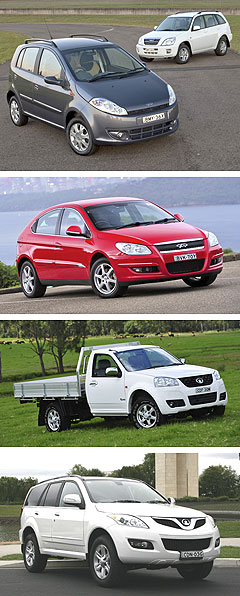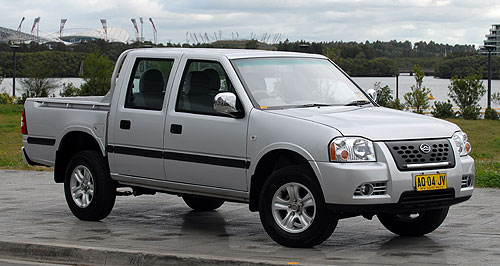News - Great WallAsbestos to stay in Chinese carsWarning label: A number of Chinese-built vehicles sold in Australia, including the Great Wall SA-series ute (pictured) have been found to contain asbestos. Chery, Great Wall must apply warning labels, but asbestos parts can remain: ACCC15 Aug 2012 THE Australian Competition and Consumer Commission (ACCC) has ruled that engine and exhaust gaskets containing asbestos do not have to be removed from about 24,000 Chinese-built Great Wall and Chery vehicles, even though such parts have been illegal on cars sold in Australia since 2003. Instead, warning labels must be applied to the engine bays, while gaskets will only be replaced if they, or the components they are attached to, need to be replaced during routine servicing or repair. About 21,500 Great Wall SA-series and V-series utes and X-series SUVs, 1700 Chery J11 compact SUVs and 550 Chery J3 light cars have been found to contain the potentially deadly substance – equating to 89 per cent of all Chinese vehicles sold by Sydney-based importer Ateco Automotive to date. The ACCC points out that many vehicles built before the asbestos ban contain the substance in similar gaskets, and it was commonplace in friction components such as brakes and clutches, meaning the vehicle service industry is well versed in managing the risks. However, the safe handling procedures are less likely to have been adhered to when working on newer vehicles assumed not to contain asbestos, which has raised the ire of Australian Manufacturing Workers Union (AMWU) acting national secretary Paul Bastian.  From top: Chery J1 and J11 J3 Great Wall V240 X240. From top: Chery J1 and J11 J3 Great Wall V240 X240.“The action doesn’t answer the problem that people may have already worked on these vehicles on engine repairs or exhaust pipe repairs,” he said. “It doesn’t answer the question about those at home who might have done their own mechanical repairs.” Mr Bastian said the measure of applying warning labels is inadequate as they were subject to being obscured by dirt, ignored or forgotten. “For example when it goes to a wrecker, it gets taken apart for small parts, it is taken out of the car, the tag’s been removed, the tag’s been dirty or someone doesn’t care – that’s just not acceptable. “There is no safe level of exposure (to asbestos) and just because this may have some economic cost to a large trading partner, to simply offer a tag option is completely unacceptable.” Mr Bastian told GoAuto he believes the Chinese manufacturers should be prosecuted for breaching Australian regulations. The ACCC says the small amounts of asbestos bound into the gasket “does not present any risk to consumers during use of the vehicle”. “However, consumers should not perform do-it-yourself maintenance that might disturb these gaskets.” In addition to issuing warning labels, Ateco has withdrawn affected vehicles and spare gaskets from sale, written to customers to notify them of the issue and advise that gaskets should only be replaced by authorised mechanics. Spare part replacements for the affected gaskets will include warnings and instructions for the safe handling and disposal of asbestos-containing gaskets and a safety training video and other materials have been prepared for repairers. ACCC deputy chair Delia Rickard said the organisation “will monitor the recall and workplace health and safety authorities will monitor the workplace safety issues”. Great Wall vehicles, especially the SA220 ute that was dropped in July 2010, are worst affected, with numerous affected gaskets deeply embedded into the drivetrain, but the Chery vehicles have asbestos-containing engine intake and exhaust gaskets that are theoretically easier to replace. Ateco’s Chinese brands spokesman Daniel Cotterill said he did not think the large number of vehicles and the logistics of replacing deeply-embedded gaskets on all of them were a factor in the ACCC’s decision to not force a gasket-replacement recall “What I drew from discussions with (the authorities) is that their number one priority is safety – the negligible risk presented is the primary factor,” he said. Mr Cotterill said Ateco had enough asbestos-free vehicles to keep sales going and that the company had prioritised the campaign over deciding what to do with the affected vehicles it had in stock but were withdrawn from sale. He suggested the easier fix on the Chery vehicles could eventually result in them being rectified and put back on sale but agreed that it could be more economical to return some of the Great Wall vehicles to China than attempt to replace all the gaskets. Mr Cotterill yesterday told GoAuto Ateco had detected the asbestos during routine compliance testing and quickly acted to rectify the issue, but the ACCC says customs detected it in imported spare parts. Asked to clarify, Mr Cotterill said customs in Western Australia discovered asbestos in a batch of gaskets. “That then kicked us into gear to bring forward what would have been tested anyway – once we had been alerted to the issue we were very quick to first stop production in China, ascertain the extent of the issue and get a handle on the risk.” He said no fines had yet been levied against Ateco for the illegal importation of asbestos. GoAuto understands the Australian Customs and Border Protection Service have previously prosecuted companies in similar situations but was still awaiting comment from the organisation at the time of publication.  Read more |
Click to shareGreat Wall articlesMotor industry news |















Facebook Twitter Instagram